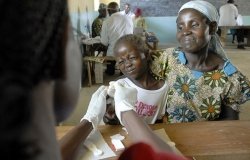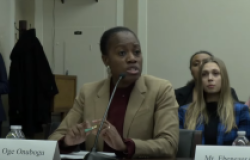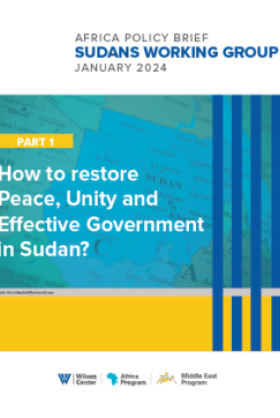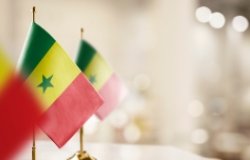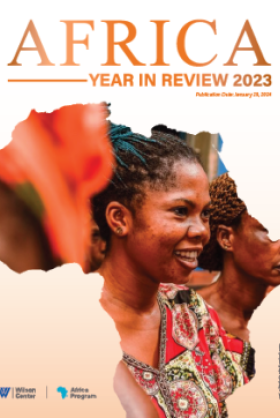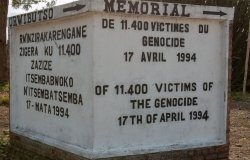South Africa and United States Relations: A Post-Election Prognosis
Moeletsi Mbeki, Deputy Chairman of the South African Institute of International Affairs (SAIIA);Ambassador Welile Nhlapo, Embassy of South Africa; Ambassador Johnnie Carson, U.S. Assistant Secretary of State for African Affairs; The Honorable Mrs. Grace Naledi Pandor, Minister of Science and Technology, South Africa; Princeton Lyman, Fellow, Council on Foreign Relations; Lerato D. Mataboge, Trade and Industry Representative, South African Embassy;Tony Carroll, Vice President, Manchester Trade; Kevin R. Boyd, Director, Office of Africa, U.S. Department of Commerce;Witney Schneidman, President, Shneidman & Associates International;
Overview
The United States and South Africa are vibrant democracies whose shared emphases on human rights, entrepreneurship, and growth and development have led the two countries to become key allies since the end of apartheid in 1994. Over the last eight years, however, differences over issues as diverse as HIV/AIDS policy, the war on terror, and international trade negotiations have led to a cooling of relations. Following the elections of President Barack Obama in the United States and President Jacob Zuma in South Africa, an era of new possibilities presents itself for the two countries to recapture the close relations of the past. On June 10, 2009, the Woodrow Wilson International Center for Scholars' Africa Program and the Council on Foreign Relations joined to sponsor a half-day long examination of the current status and the future of South African-U.S. relations.
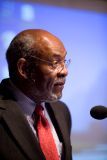 Assistant Secretary of State for African Affairs Ambassador Johnnie Carson began the morning with a keynote speech outlining the Obama administration's view of South African-U.S. relations. Carson identified South Africa as an economic locomotive crucial to Africa's long-term growth and stability. Further, he said the country's strong commitment to the rule of law and transparent, multiparty democracy is an example for all. Despite its comparative strength, South Africa has not been immune to the global recession and falling commodity prices. Carson emphasized that hard times make collaboration between the two countries even more important. He cited specific examples of further interaction that is expected to include the continuation of the U.S. President's Emergency Plan for AIDS Relief (PEPFAR), the signing of a memorandum of understanding on nuclear energy, the implementation of a megaport initiative in the harbor of Durban, and educational contributions made by U.S. Peace Corps volunteers. The United States would also like to work with South Africa toward resolving outstanding political disputes in Zimbabwe, enhancing regional trade initiatives and developing continental peacekeeping and security initiatives.
Assistant Secretary of State for African Affairs Ambassador Johnnie Carson began the morning with a keynote speech outlining the Obama administration's view of South African-U.S. relations. Carson identified South Africa as an economic locomotive crucial to Africa's long-term growth and stability. Further, he said the country's strong commitment to the rule of law and transparent, multiparty democracy is an example for all. Despite its comparative strength, South Africa has not been immune to the global recession and falling commodity prices. Carson emphasized that hard times make collaboration between the two countries even more important. He cited specific examples of further interaction that is expected to include the continuation of the U.S. President's Emergency Plan for AIDS Relief (PEPFAR), the signing of a memorandum of understanding on nuclear energy, the implementation of a megaport initiative in the harbor of Durban, and educational contributions made by U.S. Peace Corps volunteers. The United States would also like to work with South Africa toward resolving outstanding political disputes in Zimbabwe, enhancing regional trade initiatives and developing continental peacekeeping and security initiatives.
Summary of First Panel Discussion
Documents & Downloads
Hosted By

Africa Program
The Africa Program works to address the most critical issues facing Africa and US-Africa relations, build mutually beneficial US-Africa relations, and enhance knowledge and understanding about Africa in the United States. The Program achieves its mission through in-depth research and analyses, public discussion, working groups, and briefings that bring together policymakers, practitioners, and subject matter experts to analyze and offer practical options for tackling key challenges in Africa and in US-Africa relations. Read more
Thank you for your interest in this event. Please send any feedback or questions to our Events staff.




